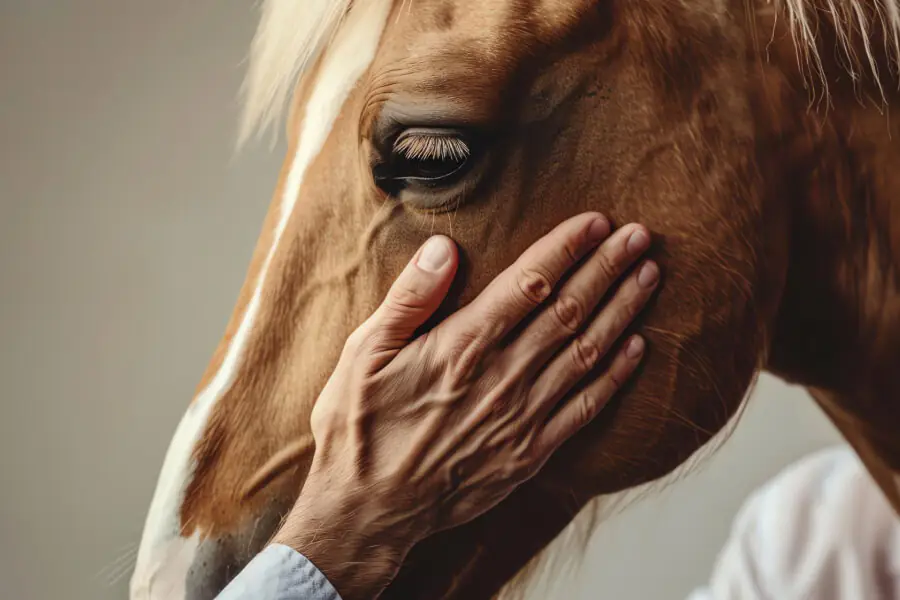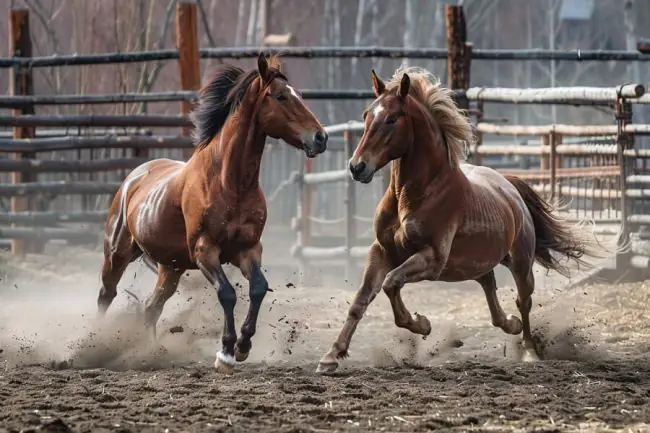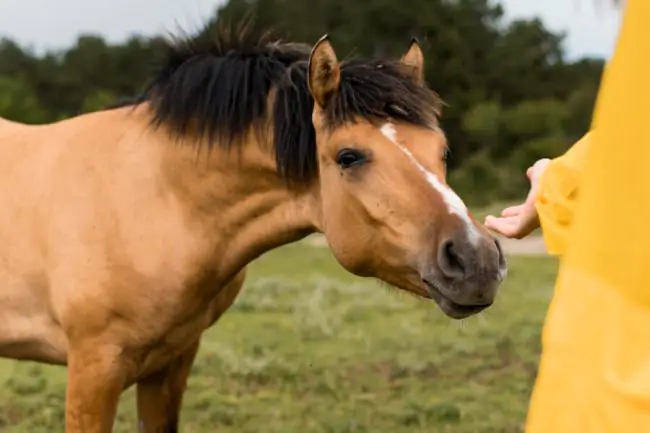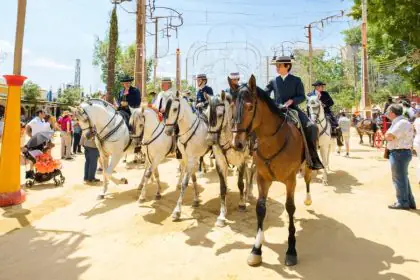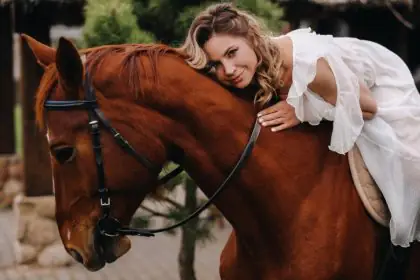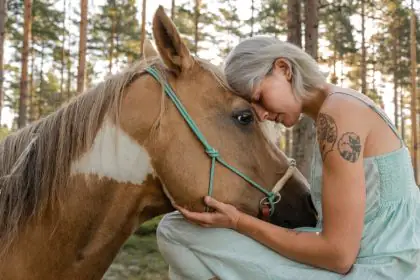Horses, just like humans, can experience emotional ups and downs—including depression.
As a horse owner, it’s ESSENTIAL to tune into your horse’s mental health, especially since they can’t tell you how they feel.
But don’t worry, with a bit of knowledge, you can spot the signs and help your horse feel their best again!
If you’ve noticed different Depression in Horses or some weird behavioral changes than usual or are curious about how to keep your horse mentally healthy, read on to discover the common causes of equine depression and practical strategies to support their emotional well-being!
Horses Mental Health
Horses are like us, they love to be around their friends and feel safe. Just like people, they can get down and feel sad sometimes.
So emotional health is just as important as physical health, and depression in horses is something every horse owner should be aware of.
It’s important to watch out for signs of horse depression, even though they might show it in different ways than we do
Impact of Depression in Horses
Horses can get depressed just like us. When they’re feeling down for a long time, it can make them feel tired, anxious, or lonely. If we don’t pay attention to their feelings, it can get worse and make them sick.
This condition is often linked to both physical and emotional factors. Without proper attention, horses’ depression can lead to decrease of their health, performance, and overall well-being. Horses suffering from depression may experience:
- Reduced energy
- Lowered immunity
- General decline in health
Ignoring the signs of depression in horses can lead back to physical issues:
- Chronic stress
- Ulcers
- behavioral problems
Early detection is key to preventing long-term damage.
Triggers and Causes of Depression in Horses
Many factors affect depression in horses, from health issues to environmental stress.
Physical Factors Affecting Mental Health
- Chronic pain
- Dental issues
- Internal conditions
What Makes Horses Unhappy
Environmental changes are another leading cause of depression in horses.
Horses need a stable and stimulating environment, and a lack of social interaction, poor stable conditions, or routine disruptions can lead to emotional stress.
Horses are creatures of habit, and any significant alteration to their environment can contribute to horse depression.
Behavioral Changes in Horses
The ability to recognize early signs of depression in horses is crucial for timely intervention.
Although each horse is unique, some common behavioral changes often indicate emotional distress.
Your Horse Appears Withdrawn
A horse suffering from depression may become distant and uninterested in interacting with humans or other horses.
If your typically social horse suddenly shows disinterest, it could be a sign of depression in horses.
Your Horse Is Experiencing Heightened Anxiety
Anxiety and depression in horses are often linked. Watch for behaviors like:
- Pacing
- Excessive head tossing
- Sweating without reason
These may be signs of emotional unrest.
Changes In Your Horse’s Appetite
A sudden change in appetite is a common indicator of depression in horses. Whether your horse is eating less or overeating, any significant change in eating habits is worth investigating.
Physical Signs of Depression in Horses
Just like people, horses can show their emotional struggles through both behavior and physical symptoms.
It’s important to pay close attention to your horse’s energy levels and body language to catch these signs early.
Drop in energy and physical activity
One of the most obvious signs of depression in horses is a drop in energy or activity. If your horse seems to be standing around more than usual, reluctant to move, or uninterested in exercise, it may be more than just tiredness—it could be a sign of emotional distress.
Think of it like how we sometimes don’t want to get out of bed when we’re feeling down.
Increased aggression or being distant
Depressed horses may also show changes in their interactions with you or other animals. Some might become unusually aggressive, acting out as a way to express their frustration or discomfort.
On the other hand, some horses might withdraw completely, isolating themselves and becoming more distant. Just like people, horses react to emotional struggles in different ways.
Excessive Self-Grooming or Lack Thereof
A horse struggling with depression may over-groom or stop grooming altogether. Both excessive grooming and a lack of grooming can signal mental health issues in horses.
Signs and Symptoms of Depression in Horses
Beyond signs of your physical shortcomings, there are other factors that lead to depression too.
Horses that are unable to Sleep
Changes in sleep patterns are another symptom of depression in horses. A horse that seems overly tired or unable to sleep may be experiencing anxiety or emotional distress.
Unexplained Weight Loss or Gain
If your horse starts losing or gaining weight without any reason, depression might be to blame.
Emotional struggles can impact their eating habits, causing them to either eat too much or too little, just like it does in humans.
4 Treatments for Dogs Depression
The good news is, with some attention and care, you can help your horse recover its emotional balance.
Creating a Safe and Stimulating Environment
Just like we feel better in a comforting, and engaging space, horses also need a clean, comfortable environment.
Make sure that your horse has access to social interaction with other horses and plenty of opportunities for physical activity.
A bored or isolated horse is more likely to develop emotional issues.
Regular Veterinary Check-ups and Consultations
Routine veterinary check-ups help catch any underlying health problems contributing to depression in horses.
Your vet can help you address both physical and mental health concerns before they escalate.
Applying Positive Reinforcement Techniques
Using positive reinforcement during training can reduce stress and anxiety, preventing the development of depression in horses. Rewarding good behavior can boost your horse’s confidence and emotional well-being.
Introduction to Horse Therapy Programs
In more serious cases of depression in horses, equine therapy programs may be beneficial.
These specialized programs are designed to support horses with emotional and behavioral issues.
Conclusion
Recognizing the early signs of depression in horses can significantly improve their quality of life. Horses need a balanced environment that supports both their mental and physical health. By paying close attention to behavioral changes and taking preventive measures, you can help your horse overcome emotional challenges and avoid long-term health problems. You can discover more of horses diseases here
FAQs
How can you tell if your horse is depressed?
Signs of depression in horses include withdrawal from social interactions, changes in appetite, and increased anxiety or physical inactivity.
What behavioral characteristics indicate depression in horses?
Common behavioral signs of depression in horses include lethargy, excessive grooming, or lack of interest in activities they once enjoyed.
What causes behavioral changes in horses?
Behavioral changes can be caused by physical discomfort, environmental stress, or a disruption in their routine, all of which may lead to depression in horses.
Why is my horse grumpy all of a sudden?
A sudden change in mood may signal depression in horses due to physical pain, stress, or emotional distress.

